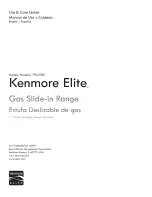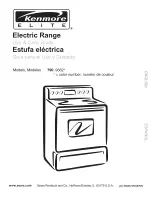
14
Setting Surface Burners
For most cooking:
Start on the highest setting and then turn to a lower setting to
complete the process. Use the recommendations below as a
guide for determining proper flame size for various types of
cooking (
Table 1
).
For deep fat frying:
Use a thermometer and adjust the surface knob accordingly. If
the fat is too cool, the food will absorb the fat and be greasy. If
the fat is too hot, the food will brown so quickly that the center
will be under cooked. Do not attempt to deep fat fry too much
food at once as the food will neither brown or cook properly.
Table 1:
Suggested flame settings
Home Canning
Be sure to read and observe all the following points when
home canning with your appliance.
Check with the United States Department of Agriculture
(USDA) website and be sure to read all the information
they have available and follow their recommendations for
home canning procedures.
•
Use only quality flat bottom canners when home canning.
Use a straight-edge to check canner bottom.
•
When home canning, use only a completely flat bottom
canner with no ridges that radiate from the bottom center.
•
Be sure the diameter of the canner does not exceed 1 inch
beyond the grate.
•
Start with hot tap water to bring water to boil more quickly.
•
Use the highest heat setting when first bringing the water to
a boil.
•
Once boiling is achieved, reduce heat to lowest possible
setting to maintain that boil.
IMPORTANT!
Never place or straddle a cooking utensil over
two different surface cooking areas heating at the same time.
This can cause uneven heating results.
Flame size
1)
1)
These settings are based on medium weight metal or alumi-
num pans with lids. Settings may vary when using other types
of pans.
Type of cooking
High flame
Start most foods, bring water to a boil, pan
broiling
Medium flame
Maintain a slow boil, thicken sauces, gravies,
steaming
Low flame
Keep foods cooking, poaching and stewing















































